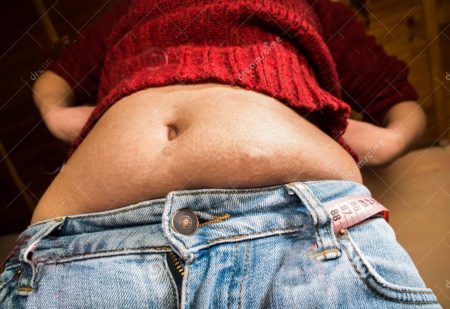True, muscle consumes around three times as much energy as fat, but the cells of our other organs are even hungrier. Fat people have larger organs and more cells overall to keep running, compared with their slim counterparts. This means that their overall energy consumption – or their resting metabolic rate – is larger. Source: Journal of Nutritional Sciences.
Are you an apple, who carries weight around their tummy, or a pear, who loads it onto their bottoms, hips and thighs? In the past, “apples” were generally considered at higher risk of heart disease and diabetes, because their abdominal fat secretes chemicals that boost inflammation, raise blood pressure and cause insulin resistance.
In contrast, the fat that sits on your buttocks was thought to be relatively benign, but recent research from the University of California at Davis suggests that this so-called “gluteal” fat also releases these harmful substances. In other words, whatever your body shape, too much excess fat could be bad news. Source: University of California, Davis.
Although many women like to think of themselves as “hourglass-shaped” (or a pear with a couple of apples on top) 3D body-scanners tell a different story. When Manchester-based researchers used these machines to scan 240 British women, they found that 63% of them had similar bust, waist and shoulder measurements, and little waist to speak of – making them “rectangle-shaped”. Only 13% were an “hourglass”; the rest were “pears” (8%); “spoons” (a top-heavy hourglass shape) (7%); “inverted triangles” (6%), and “triangles” (3%). Women also become more rectangular as they age: 80% of women over the age of 56 fell into this category. Source: Manchester Metropolitan University.
Though “man boobs” – aka gynaecomastia – often go hand in hand with a beer belly and a double chin, they’re not as flabby as they look. In fact, in most cases they are caused by the growth of breast tissue. Overweight men sometimes develop them because fat cells produce the female hormone, oestrogen, which stimulates breast growth. And while testosterone would usually inhibit such growth, levels of testosterone decline as men age. Source: UK National Health Service.
When Turkish researchers surveyed 200 men, they found that those with a higher BMI and an obvious belly lasted an average 7.3 minutes in bed; men in the slimmer group lasted just 2 minutes, and were more likely to suffer from premature ejaculation. The reason is probably reduced testosterone, which often goes hand in hand with obesity. However, while large men may last longer, they may struggle to get it up in the first place: being overweight is also associated with erectile dysfunction. Source: International Journal of Impotence Research.
Hits: 96
